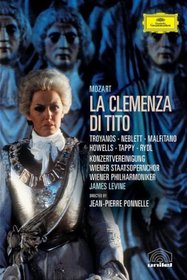| Actors: Eric Tappy, Tatiana Troyanos, Carol Neblett, Anne Howells, Kurt Rydl Director: Jean-Pierre Ponnelle Creators: Carlo Di Palma, Caterino Mazzolà, Pietro Metastasio Genres: Indie & Art House, Music Video & Concerts, Musicals & Performing Arts Sub-Genres: Indie & Art House, Music Video & Concerts, Classical Studio: Deutsche Grammophon Format: DVD - Color DVD Release Date: 04/11/2006 Original Release Date: 01/01/2006 Theatrical Release Date: 00/00/2006 Release Year: 2006 Run Time: 2hr 16min Screens: Color Number of Discs: 1 SwapaDVD Credits: 1 Total Copies: 0 Members Wishing: 1 Edition: Classical MPAA Rating: NR (Not Rated) Languages: Italian |
Search - Mozart - La Clemenza di Tito / Tatiana Troyanos, Eric Tappy, Carol Neblett, Catherine Malfitano, Kurt Rydl, James Levine on DVD
  | Mozart - La Clemenza di Tito / Tatiana Troyanos Eric Tappy Carol Neblett Catherine Malfitano Kurt Rydl James Levine Actors: Eric Tappy, Tatiana Troyanos, Carol Neblett, Anne Howells, Kurt Rydl Director: Jean-Pierre Ponnelle Genres: Indie & Art House, Music Video & Concerts, Musicals & Performing Arts NR 2006 2hr 16min No Description Available. Genre: Music Videos - Classical Rating: NR Release Date: 11-APR-2006 Media Type: DVD |
Larger Image |
Movie DetailsSimilar Movies
|
Movie ReviewsWhy Not Just Enjoy It? Giordano Bruno | Wherever I am, I am. | 10/06/2009 (5 out of 5 stars) "Technical criticism on musical or historical issues might be fun, but most of the reviews (except Mike Birman's) are just carping at details. I watched this film of La Clemenza di Tito yesterday evening for the second time, enjoyed it heartily even though I had to pause it a few times to 'elucidate' Roman history for other watchers (by their request), and grasped something about the director's concept that I hadn't grasped on first viewing.
Film? Yes, this is a film, not a filmed stage production. It was, I assume, recorded musically in a studio, and the music is patently edited, spliced, reverbed at times, modified in the way film sounds are modified. Such effects would be audible on a CD release. The action was staged in snippet-scenes in three different locations in Rome: at the Arch of Titus, Caracalla's Baths, and Hadrian's Villa in Tivoli. The lip-synching is very good, really, but no one could possibly not realize that it is happening. So it's a FILM, mate! Enjoy it as such! And go to the opera house when you have a chance, when a stage performance of Clemenza comes to your locality. Like... maybe in your next lifetime? The acting can hardly be described as static. It's wildly melodramatic, with wide staring eyes, close-ups of faces in the sort of anguish that would make singing rather dicey, broad gestures, camera pans to and from. Those wide staring eyes didn't sit well with me on first viewing; the second time around, I realized what director Jean-Pierre Ponelle was conveying: obsession! His "Clemenza" is a tale of obsessive lust for power, obsessive jealousy, obsessive love, and the Emperor Titus's obsession with his own self-image. Now, honestly, I'm not sure Mozart had such a psychological drama in mind, but Ponelle's interpretation doesn't detract or distract from the central theme of the opera, which is a 'sermon in music' on the ideal of benign governance. Or a lecture to the Monarch, you might say, since one can imagine a Head of State in attendance. Just as much as Mozart/Beaumarchais had a subversive anti-aristocratic message to convey in "Le Nozze di Figaro", Mozart and librettist Pietro Metastasio had a subversive anti-autocratic message to convey in "Clemenza". That message is eloquently expressed in this production. Casting Carol Neblett as the power-obsessed Vitellia was a stroke of genius. She glares and pouts and struts narcissistically, and dominates poor wimpy Sesto so viciously that one can bleed for his torn loyalties. Sesto is sung very beutifully by Tatiana Troyanos; I suppose her singing in this male role might be altogether too beautiful for the character portrayal, and she altogether too obviously feminine, but hey! it's all about music of us, right? Anne Howells sings nearly as well in the secondary role of Annio, but perhaps, just perhaps, a more masculine portrayal would have been desirable. This film was made 30 years ago; today that role might have been given to a male soprano like Philippe Jaroussky. Eric Tappy makes expressive musical sense of the recitativos of Titus; there's a lot of recitativo in this opera, and it HAS to have musical values. Basso Kurt Rydl is an eloquent Publio. There's another prominent "singer" in this opera -- the clarinet! Mozart wrote quite a lot of clarinet music in his last years, not only the wonderful concerto and the divine quintet, but several pieces of chamber music, including an 'adagio' for clarinet and basset horns K580. The clarinet obbligatos in "Clemenza" are superb compositional embellishments as well as affective dramatic counterpoint to the themes of the arias. "La Clemenza di Tito" is less familiar to modern audiences than Mozart's other great operas. For most listeners, the lack of familiarity will make the music seem less memorable. Let me venture to say that it's the Memory that comes first, that intensifies the listener's response. When you've heard "Clemenza" as often as "Figaro", you'll be thrilled to discover what memorable music it is." |




![Mozart - Die Entfuhrung aus dem Serail [Abduction from the Seraglio]](/images/no_cover/s.jpg)